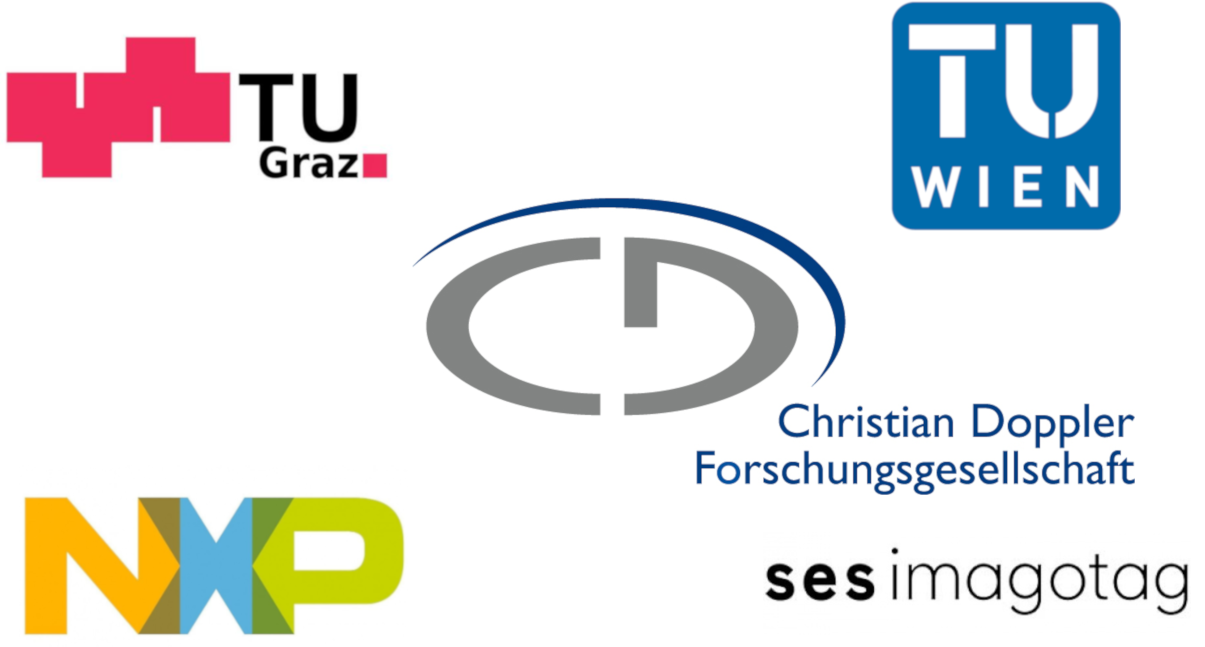The Christian Doppler Laboratory for Location-Aware Electronic Systems has the long-term vision of investigating fundamental limitations of location-aware electronic systems and creating and validating key algorithm solutions and transducer hardware designs for it.
Localization is a key feature of current and future electronic systems. It is often a profound challenge to reach the desired levels of robustness, accuracy, timeliness, and efficiency, targeting at a wide range of end-user applications, potentially with mission-critical performance requirements such as, e.g., in autonomous driving. In addition, emerging location-based and location-aware systems are based on very heterogeneous technology platforms, ranging from RFID transponders to smart phones and self-driving cars.
Research of past decades on global navigation satellite systems (GNSS) has shown that the rigorous modeling of physical influences in combination with exploitation of side-channel information can yield excellent performance for a huge set of practical applications. The proposed CD-Laboratory aims at addressing in a systematic way those application domains that go beyond the physical limits of GNSS, for instance indoor scenarios. The investigated sensing technologies will be focused on radio systems but include also, e.g., optical systems, ultrasound, and inertial sensing units.
The design of electronic systems for positioning is a multi-disciplinary challenge rooted in telecommunications engineering, requiring insight in disciplines such as electronics and microwave engineering, wireless communications, signal processing, estimation and detection theory, Bayesian inference, propagation channel modeling, and machine learning. The proposed approach extends from the modeling of sensing signals and signal transducers, via transducer adaptation and sensor data fusion, to the modeling of environment properties, aiming at a fully cognitive sensing system that provides location awareness to services building upon this sensing platform.
Related People:
Related publications
Journal article Möderl J. , Pernkopf F. , Witrisal K. & Leitinger E. (2025) Fast Variational Block-Sparse Bayesian Learning . in IEEE Transactions on Signal Processing , 73 , p. 4856-4872. [more info ]Conference paper Deutschmann B. , Nelson C., Henriksson M., Marti G., Kosasih A., Tervo N., Leitinger E. & Tufvesson F. (2024) Accurate Direct Positioning in Distributed MIMO Using Delay-Doppler Channel Measurements . in 25th IEEE International Workshop on Signal Processing Advances in Wireless Communications, SPAWC 2024 (pp. 606-610). [more info ] [doi ]Conference paper Möderl J. , Posch S., Pernkopf F. & Witrisal K. (2024) UWBCarGraz Dataset for Car Occupancy Detection using Ultra-Wideband Radar . in 2024 IEEE Radar Conference, RadarConf 2024 . [more info ] [doi ]Journal article Möderl J. , Leitinger E. , Pernkopf F. & Witrisal K. (2024) Variational Inference of Structured Line Spectra Exploiting Group-Sparsity . in IEEE Transactions on Signal Processing . [more info ]Preprint Grebien S., Leitinger E. , Witrisal K. & Fleury B. (2023) Super-Resolution Estimation of UWB Channels including the Diffuse Component - An SBL-Inspired Approach .. [more info ]Preprint Venus A. , Leitinger E. , Tertinek S. & Witrisal K. (2023) A Neural-enhanced Factor Graph-based Algorithm for Robust Positioning in Obstructed LOS Situations .. [more info ]Data set/Database Möderl J. , Posch S., Pernkopf F. & Witrisal K. (2023) UWBCarGraz Dataset .. [more info ] [doi ]Journal article Wielandner L., Wilding T., Venus A. & Leitinger E. (2023) Multipath-based SLAM for Non-Ideal Reflective Surfaces Exploiting Multiple-Measurement Data Association . in Journal of Advances in Information Fusion , 18(2) , p. 59-77. [more info ]Conference paper Wielandner L., Venus A. , Wilding T. & Leitinger E. (2023) Multipath-based SLAM with Multiple-Measurement Data Association . in 26th International Conference on Information Fusion . [more info ] [doi ]Journal article Wielandner L., Leitinger E. , Meyer F. & Witrisal K. (2023) Message Passing-Based 9-D Cooperative Localization and Navigation With Embedded Particle Flow . in IEEE Transactions on Signal and Information Processing over Networks , 9(9) , p. 95-109. [more info ] [doi ]Journal article Fuchs A., Wielandner L., Neunteufel D., Arthaber H. & Witrisal K. (2023) Wideband TDoA Positioning Exploiting RSS-Based Clustering . in Sensors , 23(12) . [more info ] [doi ]Preprint Wielandner L., Leitinger E. , Meyer F. & Witrisal K. (2023) Message Passing-Based 9-D Cooperative Localization and Navigation with Embedded Particle Flow .. [more info ]Conference paper Venus A. , Leitinger E. , Tertinek S., Meyer F. & Witrisal K. (2023) Graph-based Simultaneous Localization and Bias Tracking for Robust Positioning in Obstructed LOS Situations . in 56th Asilomar Conference on Signals, Systems, and Computers (pp. 777-784). [more info ] [doi ]Conference paper Fuchs A. & Witrisal K. (2022) Time-of-Arrival Estimation for Positioning in Bandwidth-Limited Dense Multipath Channels . in 23rd IEEE International Workshop on Signal Processing Advances in Wireless Communication (pp. 1-5). [more info ] [doi ]Conference paper Wielandner L., Leitinger E. , Meyer F., Teague B. & Witrisal K. (2022) Message Passing-Based Cooperative Localization with Embedded Particle Flow . in 47th IEEE International Conference on Acoustics, Speech and Signal Processing (pp. 5652-5656). [more info ] [doi ]Preprint Leitinger E. , Venus A. , Teague B. & Meyer F. (2022) Data Fusion for Multipath-Based SLAM: Combining Information from Multiple Propagation Paths .. [more info ] [doi ]Journal article Li X., Leitinger E. , Venus A. & Tufvesson F. (2022) Sequential Detection and Estimation of Multipath Channel Parameters Using Belief Propagation . in IEEE Transactions on Wireless Communications , 21(10) , p. 8385-8402. [more info ] [doi ]Conference paper Leitinger E. , Teague B., Zhang W., Liang M. & Meyer F. (2022) Data Fusion for Radio Frequency SLAM with Robust Sampling . in 25th International Conference on Information Fusion (pp. 1-6). [more info ] [doi ]Preprint Wilding T., Leitinger E. & Witrisal K. (2021) Multipath-based Localization and Tracking considering Off-Body Channel Effects .. [more info ]Preprint Li X., Leitinger E. , Venus A. & Tufvesson F. (2021) Sequential Detection and Estimation of Multipath Channel Parameters Using Belief Propagation .. [more info ]Conference paper Venus A. , Leitinger E. , Tertinek S. & Witrisal K. (2021) A Message Passing based Adaptive PDA Algorithm for Robust Radio-based Localization and Tracking . in COST CA15104 ACTION: Inclusive Radio Communication Networks for 5G and Beyond . [more info ]Conference paper Rath M., Koller A. & Witrisal K. (2021) Map-based Antenna Adaptation for Multipath-assisted Positioning . in 22nd IEEE International Workshop on Signal Processing Advances in Wireless Communications (pp. 431-435). [more info ] [doi ]Conference paper Venus A. , Leitinger E. , Tertinek S. & Witrisal K. (2021) A Message Passing based Adaptive PDA Algorithm for Robust Radio-based Localization and Tracking . in 2021 IEEE Radar Conference . [more info ]Conference paper Leitinger E. , Grebien S. & Witrisal K. (2021) Multipath-based SLAM using Belief Propagation with Interacting Multiple Dynamic Models . in 15th European Conference on Antennas and Propagation (pp. 1-5). [more info ] [doi ]Conference paper Wielandner L., Leitinger E. & Witrisal K. (2021) An Adaptive Algorithm for Joint Cooperative Localization and Orientation Estimation using Belief Propagation . in 55th Asilomar Conference on Signals, Systems, and Computers (pp. 1591-1596). [more info ] [doi ]Journal article Wielandner L., Leitinger E. & Witrisal K. (2021) RSS-Based Cooperative Localization and Orientation Estimation Exploiting Antenna Directivity . in IEEE Access , 9 , p. 53046-53060. [more info ] [doi ]Chapter Witrisal K. , Anton-Haro C., Grebien S., Joseph W., Leitinger E. , Li X., Peral-Rosado J., Plets D., Vilà-Valls J. & Wilding T. (2021) Chapter 9 - Localization and tracking . 41 p.. [more info ] [doi ]Conference paper Wilding T., Leitinger E. , Muehlmann U. & Witrisal K. (2021) Statistical Modeling of the Human Body as an Extended Antenna . in 15th European Conference on Antennas and Propagation . [more info ] [doi ]Conference paper Venus A. , Leitinger E. , Tertinek S. & Witrisal K. (2020) Reliability and Threshold-Region Performance of TOA Estimators in Dense Multipath Channels . in 2020 IEEE International Conference on Communications (pp. 1-7). [more info ] [doi ]


